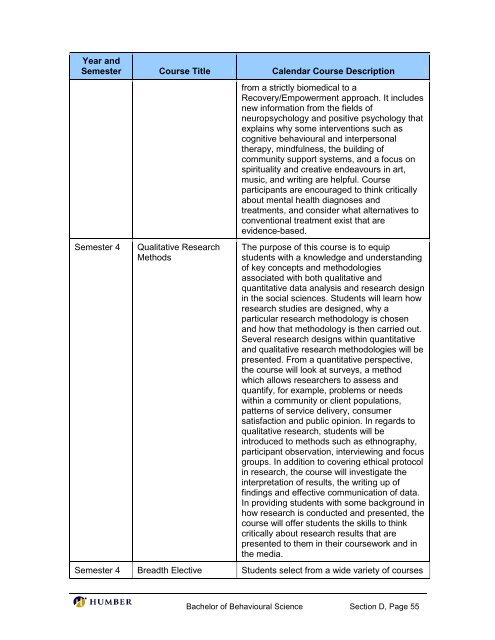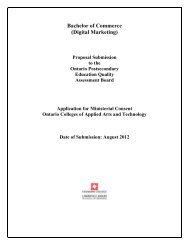Bachelor of Behavioural Science - Postsecondary Education Quality ...
Bachelor of Behavioural Science - Postsecondary Education Quality ...
Bachelor of Behavioural Science - Postsecondary Education Quality ...
Create successful ePaper yourself
Turn your PDF publications into a flip-book with our unique Google optimized e-Paper software.
Year and<br />
Semester Course Title Calendar Course Description<br />
Semester 4<br />
Qualitative Research<br />
Methods<br />
from a strictly biomedical to a<br />
Recovery/Empowerment approach. It includes<br />
new information from the fields <strong>of</strong><br />
neuropsychology and positive psychology that<br />
explains why some interventions such as<br />
cognitive behavioural and interpersonal<br />
therapy, mindfulness, the building <strong>of</strong><br />
community support systems, and a focus on<br />
spirituality and creative endeavours in art,<br />
music, and writing are helpful. Course<br />
participants are encouraged to think critically<br />
about mental health diagnoses and<br />
treatments, and consider what alternatives to<br />
conventional treatment exist that are<br />
evidence-based.<br />
The purpose <strong>of</strong> this course is to equip<br />
students with a knowledge and understanding<br />
<strong>of</strong> key concepts and methodologies<br />
associated with both qualitative and<br />
quantitative data analysis and research design<br />
in the social sciences. Students will learn how<br />
research studies are designed, why a<br />
particular research methodology is chosen<br />
and how that methodology is then carried out.<br />
Several research designs within quantitative<br />
and qualitative research methodologies will be<br />
presented. From a quantitative perspective,<br />
the course will look at surveys, a method<br />
which allows researchers to assess and<br />
quantify, for example, problems or needs<br />
within a community or client populations,<br />
patterns <strong>of</strong> service delivery, consumer<br />
satisfaction and public opinion. In regards to<br />
qualitative research, students will be<br />
introduced to methods such as ethnography,<br />
participant observation, interviewing and focus<br />
groups. In addition to covering ethical protocol<br />
in research, the course will investigate the<br />
interpretation <strong>of</strong> results, the writing up <strong>of</strong><br />
findings and effective communication <strong>of</strong> data.<br />
In providing students with some background in<br />
how research is conducted and presented, the<br />
course will <strong>of</strong>fer students the skills to think<br />
critically about research results that are<br />
presented to them in their coursework and in<br />
the media.<br />
Semester 4 Breadth Elective Students select from a wide variety <strong>of</strong> courses<br />
<strong>Bachelor</strong> <strong>of</strong> <strong>Behavioural</strong> <strong>Science</strong> Section D, Page 55
















